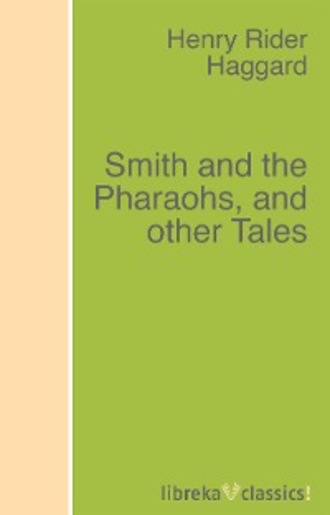
Полная версия
Smith and the Pharaohs, and other Tales
Such preliminary matters having been arranged by correspondence, Smith, after a few days spent in the Museum at Cairo, took the night train to Luxor, where he found his head-man, an ex-dragoman named Mahomet, waiting for him and his fellaheen labourers already hired. There were but forty of them, for his was a comparatively small venture. Three hundred pounds was the amount that he had made up his mind to expend, and such a sum does not go far in excavations.
During his visit of the previous year Smith had marked the place where he meant to dig. It was in the cemetery of old Thebes, at the wild spot not far from the temple of Medinet Habu, that is known as the Valley of the Queens. Here, separated from the resting-places of their royal lords by the bold mass of the intervening hill, some of the greatest ladies of Egypt have been laid to rest, and it was their tombs that Smith desired to investigate. As he knew well, some of these must yet remain to be discovered. Who could say? Fortune favours the bold. It might be that he would find the holy grave of that beauteous, unknown Royalty whose face had haunted him for three long years!
For a whole month he dug without the slightest success. The spot that he selected had proved, indeed, to be the mouth of a tomb. After twenty-five days of laborious exploration it was at length cleared out, and he stood in a rude, unfinished cave. The queen for whom it had been designed must have died quite young and been buried elsewhere; or she had chosen herself another sepulchre, or mayhap the rock had proved unsuitable for sculpture.
Smith shrugged his shoulders and moved on, sinking trial pits and trenches here and there, but still finding nothing. Two-thirds of his time and money had been spent when at last the luck turned. One day, towards evening, with some half-dozen of his best men he was returning after a fruitless morning of labour, when something seemed to attract him towards a little wadi, or bay, in the hillside that was filled with tumbled rocks and sand. There were scores of such places, and this one looked no more promising than any of the others had proved to be. Yet it attracted him. Thoroughly dispirited, he walked past it twenty paces or more, then turned.
"Where go you, sah?" asked his head-man, Mahomet.
He pointed to the recess in the cliff.
"No good, sah," said Mahomet. "No tomb there. Bed-rock too near top. Too much water run in there; dead queen like keep dry!"
But Smith went on, and the others followed obediently.
He walked down the little slope of sand and boulders and examined the cliff. It was virgin rock; never a tool mark was to be seen. Already the men were going, when the same strange instinct which had drawn him to the spot caused him to take a spade from one of them and begin to shovel away the sand from the face of the cliff—for here, for some unexplained reason, were no boulders or debris. Seeing their master, to whom they were attached, at work, they began to work too, and for twenty minutes or more dug on cheerfully enough, just to humour him, since all were sure that here there was no tomb. At length Smith ordered them to desist, for, although now they were six feet down, the rock remained of the same virgin character.
With an exclamation of disgust he threw out a last shovelful of sand. The edge of his spade struck on something that projected. He cleared away a little more sand, and there appeared a rounded ledge which seemed to be a cornice. Calling back the men, he pointed to it, and without a word all of them began to dig again. Five minutes more of work made it clear that it was a cornice, and half an hour later there appeared the top of the doorway of a tomb.
"Old people wall him up," said Mahomet, pointing to the flat stones set in mud for mortar with which the doorway had been closed, and to the undecipherable impress upon the mud of the scarab seals of the officials whose duty it had been to close the last resting-place of the royal dead for ever.
"Perhaps queen all right inside," he went on, receiving no answer to his remark.
"Perhaps," replied Smith, briefly. "Dig, man, dig! Don't waste time in talking."
So they dug on furiously till at length Smith saw something which caused him to groan aloud. There was a hole in the masonry—the tomb had been broken into. Mahomet saw it too, and examined the top of the aperture with his skilled eye.
"Very old thief," he said. "Look, he try build up wall again, but run away before he have time finish." And he pointed to certain flat stones which had been roughly and hurriedly replaced.
"Dig—dig!" said Smith.
Ten minutes more and the aperture was cleared. It was only just big enough to admit the body of a man.
By now the sun was setting. Swiftly, swiftly it seemed to tumble down the sky. One minute it was above the rough crests of the western hills behind them; the next, a great ball of glowing fire, it rested on their topmost ridge. Then it was gone. For an instant a kind of green spark shone where it had been. This too went out, and the sudden Egyptian night was upon them.
The fellaheen muttered among themselves, and one or two of them wandered off on some pretext. The rest threw down their tools and looked at Smith. "Men say they no like stop here. They afraid of ghost! Too many afreet live in these tomb. That what they say. Come back finish to-morrow morning when it light. Very foolish people, these common fellaheen," remarked Mahomet, in a superior tone.
"Quite so," replied Smith, who knew well that nothing that he could offer would tempt his men to go on with the opening of a tomb after sunset. "Let them go away. You and I will stop and watch the place till morning."
"Sorry, sah," said Mahomet, "but I not feel quite well inside; think I got fever. I go to camp and lie down and pray under plenty blanket."
"All right, go," said Smith; "but if there is anyone who is not a coward, let him bring me my big coat, something to eat and drink, and the lantern that hangs in my tent. I will meet him there in the valley."
Mahomet, though rather doubtfully, promised that this should be done, and, after begging Smith to accompany them, lest the spirit of whoever slept in the tomb should work him a mischief during the night, they departed quickly enough.
Smith lit his pipe, sat down on the sand, and waited. Half an hour later he heard a sound of singing, and through the darkness, which was dense, saw lights coming up the valley.
"My brave men," he thought to himself, and scrambled up the slope to meet them.
He was right. These were his men, no less than twenty of them, for with a fewer number they did not dare to face the ghosts which they believed haunted the valley after nightfall. Presently the light from the lantern which one of them carried (not Mahomet, whose sickness had increased too suddenly to enable him to come) fell upon the tall form of Smith, who, dressed in his white working clothes, was leaning against a rock. Down went the lantern, and with a howl of terror the brave company turned and fled.
"Sons of cowards!" roared Smith after them, in his most vigorous Arabic. "It is I, your master, not an afreet."
They heard, and by degrees crept back again. Then he perceived that in order to account for their number each of them carried some article. Thus one had the bread, another the lantern, another a tin of sardines, another the sardine-opener, another a box of matches, another a bottle of beer, and so on. As even thus there were not enough things to go round, two of them bore his big coat between them, the first holding it by the sleeves and the second by the tail as though it were a stretcher.
"Put them down," said Smith, and they obeyed. "Now," he added, "run for your lives; I thought I heard two afreets talking up there just now of what they would do to any followers of the Prophet who mocked their gods, if perchance they should meet them in their holy place at night."
This kindly counsel was accepted with much eagerness. In another minute Smith was alone with the stars and the dying desert wind.
Collecting his goods, or as many of them as he wanted, he thrust them into the pockets of the great-coat and returned to the mouth of the tomb. Here he made his simple meal by the light of the lantern, and afterwards tried to go to sleep. But sleep he could not. Something always woke him. First it was a jackal howling amongst the rocks; next a sand-fly bit him in the ankle so sharply that he thought he must have been stung by a scorpion. Then, notwithstanding his warm coat, the cold got hold of him, for the clothes beneath were wet through with perspiration, and it occurred to him that unless he did something he would probably contract an internal chill or perhaps fever. He rose and walked about.
By now the moon was up, revealing all the sad, wild scene in its every detail. The mystery of Egypt entered his soul and oppressed him. How much dead majesty lay in the hill upon which he stood? Were they all really dead, he wondered, or were those fellaheen right? Did their spirits still come forth at night and wander through the land where once they ruled? Of course that was the Egyptian faith according to which the Ka, or Double, eternally haunted the place where its earthly counterpart had been laid to rest. When one came to think of it, beneath a mass of unintelligible symbolism there was much in the Egyptian faith which it was hard for a Christian to disbelieve. Salvation through a Redeemer, for instance, and the resurrection of the body. Had he, Smith, not already written a treatise upon these points of similarity which he proposed to publish one day, not under his own name? Well, he would not think of them now; the occasion seemed scarcely fitting—they came home too pointedly to one who was engaged in violating a tomb.
His mind, or rather his imagination—of which he had plenty—went off at a tangent. What sights had this place seen thousands of years ago! Once, thousands of years ago, a procession had wound up along the roadway which was doubtless buried beneath the sand whereon he stood towards the dark door of this sepulchre. He could see it as it passed in and out between the rocks. The priests, shaven-headed and robed in leopards' skins, or some of them in pure white, bearing the mystic symbols of their office. The funeral sledge drawn by oxen, and on it the great rectangular case that contained the outer and the inner coffins, and within them the mummy of some departed Majesty; in the Egyptian formula, "the hawk that had spread its wings and flown into the bosom of Osiris," God of Death. Behind, the mourners, rending the air with their lamentations. Then those who bore the funeral furniture and offerings. Then the high officers of State and the first priests of Amen and of the other gods. Then the sister queens, leading by the hand a wondering child or two. Then the sons of Pharaoh, young men carrying the emblems of their rank.
Lastly, walking alone, Pharaoh himself in his ceremonial robes, his apron, his double crown of linen surmounted by the golden snake, his inlaid bracelets and his heavy, tinkling earrings. Pharaoh, his head bowed, his feet travelling wearily, and in his heart—what thoughts? Sorrow, perhaps, for her who had departed. Yet he had other queens and fair women without count. Doubtless she was sweet and beautiful, but sweetness and beauty were not given to her alone. Moreover, was she not wont to cross his will and to question his divinity? No, surely it is not only of her that he thinks, her for whom he had prepared this splendid tomb with all things needful to unite her with the gods. Surely he thinks also of himself and that other tomb on the farther side of the hill whereat the artists labour day by day—yes, and have laboured these many years; that tomb to which before so very long he too must travel in just this fashion, to seek his place beyond the doors of Death, who lays his equal hand on king and queen and slave.
The vision passed. It was so real that Smith thought he must have been dreaming. Well, he was awake now, and colder than ever. Moreover, the jackals had multiplied. There were a whole pack of them, and not far away. Look! One crossed in the ring of the lamplight, a slinking, yellow beast that smelt the remains of dinner. Or perhaps it smelt himself. Moreover, there were bad characters who haunted these mountains, and he was alone and quite unarmed. Perhaps he ought to put out the light which advertised his whereabouts. It would be wise, and yet in this particular he rejected wisdom. After all, the light was some company.
Since sleep seemed to be out of the question, he fell back upon poor humanity's other anodyne, work, which has the incidental advantage of generating warmth. Seizing a shovel, he began to dig at the doorway of the tomb, whilst the jackals howled louder than ever in astonishment. They were not used to such a sight. For thousands of years, as the old moon above could have told, no man, or at least no solitary man, had dared to rob tombs at such an unnatural hour.
When Smith had been digging for about twenty minutes something tinkled on his shovel with a noise which sounded loud in that silence.
"A stone which may come in handy for the jackals," he thought to himself, shaking the sand slowly off the spade until it appeared. There it was, and not large enough to be of much service. Still, he picked it up, and rubbed it in his hands to clear off the encrusting dirt. When he opened them he saw that it was no stone, but a bronze.
"Osiris," reflected Smith, "buried in front of the tomb to hallow the ground. No, an Isis. No, the head of a statuette, and a jolly good one, too—at any rate, in moonlight. Seems to have been gilded." And, reaching out for the lamp, he held it over the object.
Another minute, and he found himself sitting at the bottom of the hole, lamp in one hand and statuette, or rather head, in the other.
"The Queen of the Mask!" he gasped. "The same—the same! By heavens, the very same!"
Oh, he could not be mistaken. There were the identical lips, a little thick and pouted; the identical nostrils, curved and quivering, but a little wide; the identical arched eyebrows and dreamy eyes set somewhat far apart. Above all, there was the identical alluring and mysterious smile. Only on this masterpiece of ancient art was set a whole crown of uraei surrounding the entire head. Beneath the crown and pressed back behind the ears was a full-bottomed wig or royal head-dress, of which the ends descended to the breasts. The statuette, that, having been gilt, remained quite perfect and uncorroded, was broken just above the middle, apparently by a single violent blow, for the fracture was very clean.
At once it occurred to Smith that it had been stolen from the tomb by a thief who thought it to be gold; that outside of the tomb doubt had overtaken him and caused him to break it upon a stone or otherwise. The rest was clear. Finding that it was but gold-washed bronze he had thrown away the fragments, rather than be at the pains of carrying them. This was his theory, probably not a correct one, as the sequel seems to show.
Smith's first idea was to recover the other portion. He searched quite a long while, but without success. Neither then nor afterwards could it be found. He reflected that perhaps this lower half had remained in the thief's hand, who, in his vexation, had thrown it far away, leaving the head to lie where it fell. Again Smith examined this head, and more closely. Now he saw that just beneath the breasts was a delicately cut cartouche.
Being by this time a master of hieroglyphics, he read it without trouble. It ran: "Ma-Mee, Great Royal Lady. Beloved of ——" Here the cartouche was broken away.
"Ma-Me, or it might be Ma-Mi," he reflected. "I never heard of a queen called Ma-Me, or Ma-Mi, or Ma-Mu. She must be quite new to history. I wonder of whom she was beloved? Amen, or Horus, or Isis, probably. Of some god, I have no doubt, at least I hope so!"
He stared at the beautiful portrait in his hand, as once he had stared at the cast on the Museum wall, and the beautiful portrait, emerging from the dust of ages, smiled back at him there in the solemn moonlight as once the cast had smiled from the museum wall. Only that had been but a cast, whereas this was real. This had slept with the dead from whose features it had been fashioned, the dead who lay, or who had lain, within.
A sudden resolution took hold of Smith. He would explore that tomb, at once and alone. No one should accompany him on this his first visit; it would be a sacrilege that anyone save himself should set foot there until he had looked on what it might contain.
Why should he not enter? His lamp, of what is called the "hurricane" brand, was very good and bright, and would burn for many hours. Moreover, there had been time for the foul air to escape through the hole that they had cleared. Lastly, something seemed to call on him to come and see. He placed the bronze head in his breast-pocket over his heart, and, thrusting the lamp through the hole, looked down. Here there was no difficulty, since sand had drifted in to the level of the bottom of the aperture. Through it he struggled, to find himself upon a bed of sand that only just left him room to push himself along between it and the roof. A little farther on the passage was almost filled with mud.
Mahomet had been right when, from his knowledge of the bed-rock, he said that any tomb made in this place must be flooded. It had been flooded by some ancient rain-storm, and Smith began to fear that he would find it quite filled with soil caked as hard as iron. So, indeed, it was to a certain depth, a result that apparently had been anticipated by those who hollowed it, for this entrance shaft was left quite undecorated. Indeed, as Smith found afterwards, a hole had been dug beneath the doorway to allow the mud to enter after the burial was completed. Only a miscalculation had been made. The natural level of the mud did not quite reach the roof of the tomb, and therefore still left it open.
After crawling for forty feet or so over this caked mud, Smith suddenly found himself on a rising stair. Then he understood the plan; the tomb itself was on a higher level.
Here began the paintings. Here the Queen Ma-Mee, wearing her crowns and dressed in diaphanous garments, was presented to god after god. Between her figure and those of the divinities the wall was covered with hieroglyphs as fresh to-day as on that when the artist had limned them. A glance told him that they were extracts from the Book of the Dead. When the thief of bygone ages had broken into the tomb, probably not very long after the interment, the mud over which Smith had just crawled was still wet. This he could tell, since the clay from the rascal's feet remained upon the stairs, and that upon his fingers had stained the paintings on the wall against which he had supported himself; indeed, in one place was an exact impression of his hand, showing its shape and even the lines of the skin.
At the top of the flight of steps ran another passage at a higher level, which the water had never reached, and to right and left were the beginnings of unfinished chambers. It was clear to him that this queen had died young. Her tomb, as she or the king had designed it, was never finished. A few more paces, and the passage enlarged itself into a hall about thirty feet square. The ceiling was decorated with vultures, their wings outspread, the looped Cross of Life hanging from their talons. On one wall her Majesty Ma-Mee stood expectant while Anubis weighed her heart against the feather of truth, and Thoth, the Recorder, wrote down the verdict upon his tablets. All her titles were given to her here, such as—"Great Royal Heiress, Royal Sister, Royal Wife, Royal Mother, Lady of the Two Lands, Palm-branch of Love, Beautiful-exceedingly."
Smith read them hurriedly and noted that nowhere could he see the name of the king who had been her husband. It would almost seem as though this had been purposely omitted. On the other walls Ma-Mee, accompanied by her Ka, or Double, made offerings to the various gods, or uttered propitiatory speeches to the hideous demons of the underworld, declaring their names to them and forcing them to say: "Pass on. Thou art pure!"
Lastly, on the end wall, triumphant, all her trials done, she, the justified Osiris, or Spirit, was received by the god Osiris, Saviour of Spirits.
All these things Smith noted hurriedly as he swung the lamp to and fro in that hallowed place. Then he saw something else which filled him with dismay. On the floor of the chamber where the coffins had been—for this was the burial chamber—lay a heap of black fragments charred with fire. Instantly he understood. After the thief had done his work he had burned the mummy-cases, and with them the body of the queen. There could be no doubt that this was so, for look! among the ashes lay some calcined human bones, while the roof above was blackened with the smoke and cracked by the heat of the conflagration. There was nothing left for him to find!
Oppressed with the closeness of the atmosphere, he sat down upon a little bench or table cut in the rock that evidently had been meant to receive offerings to the dead. Indeed, on it still lay the scorched remains of some votive flowers. Here, his lamp between his feet, he rested a while, staring at those calcined bones. See, yonder was the lower jaw, and in it some teeth, small, white, regular and but little worn. Yes, she had died young. Then he turned to go, for disappointment and the holiness of the place overcame him; he could endure no more of it that night.
Leaving the burial hall, he walked along the painted passage, the lamp swinging and his eyes fixed upon the floor. He was disheartened, and the paintings could wait till the morrow. He descended the steps and came to the foot of the mud slope. Here suddenly he perceived, projecting from some sand that had drifted down over the mud, what seemed to be the corner of a reed box or basket. To clear away the sand was easy, and—yes, it was a basket, a foot or so in length, such a basket as the old Egyptians used to contain the funeral figures which are called ushaptis, or other objects connected with the dead. It looked as though it had been dropped, for it lay upon its side. Smith opened it—not very hopefully, for surely nothing of value would have been abandoned thus.
The first thing that met his eyes was a mummied hand, broken off at the wrist, a woman's little hand, most delicately shaped. It was withered and paper-white, but the contours still remained; the long fingers were perfect, and the almond-shaped nails had been stained with henna, as was the embalmers' fashion. On the hand were two gold rings, and for those rings it had been stolen. Smith looked at it for a long while, and his heart swelled within him, for here was the hand of that royal lady of his dreams.
Indeed, he did more than look; he kissed it, and as his lips touched the holy relic it seemed to him as though a wind, cold but scented, blew upon his brow. Then, growing fearful of the thoughts that arose within him, he hurried his mind back to the world, or rather to the examination of the basket.
Here he found other objects roughly wrapped in fragments of mummy-cloth that had been torn from the body of the queen. These it is needless to describe, for are they not to be seen in the gold room of the Museum, labelled "Bijouterie de la Reine Ma-Me, XVIIIeme Dynastie. Thebes (Smith's Tomb)"? It may be mentioned, however, that the set was incomplete. For instance, there was but one of the great gold ceremonial ear-rings fashioned like a group of pomegranate blooms, and the most beautiful of the necklaces had been torn in two—half of it was missing.
It was clear to Smith that only a portion of the precious objects which were buried with the mummy had been placed in this basket. Why had these been left where he found them? A little reflection made that clear also. Something had prompted the thief to destroy the desecrated body and its coffin with fire, probably in the hope of hiding his evil handiwork. Then he fled with his spoil. But he had forgotten how fiercely mummies and their trappings can burn. Or perhaps the thing was an accident. He must have had a lamp, and if its flame chanced to touch this bituminous tinder!








